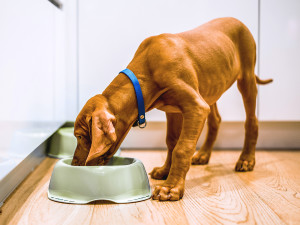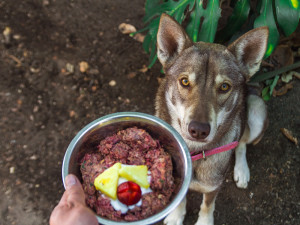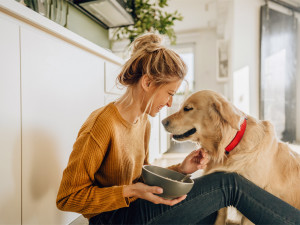What Are the Best Dog Foods for Dogs With Sensitive Stomachs?
Find out what’s best for your pup.

Share Article
In This Article:
What Is The Best Food for Dogs With Sensitive Stomachs? How To Know If Your Dog Has a Sensitive Stomach When To Seek Expert Help Dog Food Ingredients To Avoid How To Choose The Best Dog Food for Dogs With Sensitive Stomachs
Does your dog get diarrhea if they so much as sniff any food besides their own dog food? Do they frequently skip meals or need lots of encouragement to eat? Can you hear their stomach gurgling from across the room? Do their farts bring tears to your eyes? If you answered yes to any of these questions, you may consider your dog to have a sensitive stomach.
A “sensitive stomach” is a general term, and something of a misnomer, since many of these digestive problems have more to do with the intestines than the actual stomach. However, it is a way many pet parents describe a variety of digestive problems their dogs experience on a regular basis. Any dog with frequent signs of digestive upset needs to see a vet and have a thorough diagnostic work-up.
These signs are indicative of an underlying medical problem and often can be cured with the right medication or changes in diet and lifestyle. Other times, chronic conditions will require long-term management. If your dog has a diagnosed medical condition, your vet will likely recommend a therapeutic diet that is specifically formulated and proven to target certain digestive conditions. Read on to learn about the different diets that can support digestive health.

What is the best food for dogs with sensitive stomachs?
While there is no magic formula that will solve every digestive problem, there are many effective strategies that can help dogs with ongoing tummy troubles. The first step is to categorize their symptoms and determine what, exactly, is going on. This requires a trip to the vet and may include additional tests to get to a diagnosis.
This is crucial to finding the right treatment approach, medications, or foods to help your dog feel better. For example, a dog with a food allergy needs a very different plan than a dog that has chronic pancreatitis, or a dog that doesn’t make enough digestive enzymes to break down their food. Once you know what the underlying problem is, you’ll have a much easier time finding the right diet to support your dog’s recovery.
How to know if your dog has a sensitive stomach
Many times, when pet parents refer to a sensitive stomach, they may be describing a number of different digestive problems that involve the esophagus, stomach, small intestines, pancreas, or large intestine. Your vet will be able to home in on the specifics by asking more detailed questions about your dog’s symptoms, which may include:
Diarrhea: Diarrhea is an intestinal problem that can be further categorized into small-bowel versus large-bowel diarrhea depending on characteristics like frequency, urgency, volume, consistency, and the presence of blood or mucus.
Vomiting: True vomiting involves an active contraction of the belly muscles to expel material from the stomach. Sometimes, dogs also regurgitate, which is a more passive process of “spitting up” material that is in their stomach or esophagus. You can tell the difference if you observe your dog in the act.
Itchy skin: While it may seem odd that a pet parent would describe their itchy dog as having a “sensitive stomach,” many dogs with food allergies have both digestive upset and itchy skin. Dogs with food allergies may also have recurrent ear infections and/or anal gland problems.
Gas: Some dogs have foul-smelling farts that can clear a room and pet parents may notice that their gas is worse when they eat certain foods or certain types of dog food diets.
Finicky appetite: While some dogs are true chowhounds and seem to inhale their food without even tasting it, other dogs can be very picky. They may skip some meals altogether or need a lot of coaxing to eat. This can be a behavioral problem for some dogs, while for others it may be because they feel nauseous, bloated, or have abdominal pain.
Gurgly sounds: Also known as borborygmus, those gurgling sounds of fluid and gas moving through the stomach and intestines can be frequent and very loud in some dogs. This may be a sign that things are moving too fast or too slow through the digestive tract, or that there is an abnormal amount of gas or fluid present.
Weight loss: Dogs who are perpetually underweight or are losing weight in combination with other signs of digestive upset should see a vet right away. This can be a sign of digestive problems or another systemic disease.
When to seek expert help
Consulting with your vet is always a good idea when you are concerned about your dog’s health. This is especially true for signs that don’t seem to improve or resolve quickly. Dogs who seem to have a sensitive stomach or any form of ongoing digestive problems need to see a vet before any diet change is made. This is because many digestive conditions are treatable and curable in other ways and a diet change may prolong a dog’s discomfort without really treating their underlying problem.
When dogs do need a diet change for a medical condition, it is important that a veterinarian help guide pet parents to diets that will be most effective and most likely to help their dog. Unfortunately, there is a lot of misinformation and misleading marketing in dog food diets and many over-the-counter diets do not actually fulfill their claims. By working with your vet, you can help your pup get rapid relief with the most effective treatment plan.
Dog-food ingredients to avoid
Depending on your dog’s specific signs and underlying medical condition, there may be certain triggers they should avoid, including:
High-fat foods: Many dogs are sensitive to high-fat foods, especially when they are not used to them. Dogs with digestive problems like pancreatitis may be especially sensitive to fatty foods. If you have an adult dog, avoid foods labeled specifically for puppies or for “all life stages,” which may have higher fat contents than diets intended for adult dogs.
Allergens: Dogs with food allergies need to avoid certain allergens. While this may sound easy in theory, it can be a bit more complicated in practice. That’s because many over-the-counter diets that claim to be limited-ingredient or hypoallergenic diets are produced on the same equipment as other diets that may contain their allergens. This means these diets cannot be free of contamination and therefore may not be effective in improving a dog’s symptoms.
Fiber: Fiber is a broad category of nutrients that have many different effects on the digestive tract and can be extremely beneficial. While some dogs with digestive problems may benefit from increased fiber in their diets, others may need to avoid certain kinds of fiber. Until you know more about your dog’s specific diagnosis and needs, it may be a good idea to avoid high-fiber foods and consult your vet before introducing them.
How to choose the best dog food for dogs with sensitive stomachs
The best food for a dog with digestive problems will be the diet curated to meet their needs and to help manage their underlying medical conditions. The key here is that there is no one-size-fits-all perfect diet for dogs with digestive issues, but rather, many different diets aimed at conditions like food allergies, pancreatitis, inflammatory bowel disease, and more.
If your dog is diagnosed with a specific medical condition, your vet will likely recommend a prescription therapeutic diet. The reason for this is that therapeutic diets are formulated to address a specific medical condition, and they undergo deeper evaluation to guarantee their claims. Over-the-counter diets do not have to meet these requirements, and some terms like “limited ingredient” do not have a standardized definition. In other words, they do not have to meet any requirements to make those claims. With this in mind, some of the food options pet parents may want to consider include:
Best food for dogs with sensitive stomachs: Depending on the suspected cause of the digestive problem, different diets will suit different dogs. For example, dogs with suspected food allergies or inflammatory bowel disease (IBD) will do best on hydrolyzed-protein diets, or other hypoallergenic, novel-protein formulas. In these cases, over-the-counter diets are not a substitute for therapeutic diets because they are not guaranteed to be free of contaminants. Dogs who have a history of pancreatitis or seem sensitive to high fat ingredients will do best on low-fat diets with no more than 20 percent of calories from fat such as Royal Canin Gastrointestinal Low-Fat.opens in new tab
Homemade dog food for dogs with sensitive stomachs: Any homemade diet that will be used long-term must be complete and balanced to ensure all of your dog’s nutritional needs are met. The safest way to ensure this is to work directly with a veterinary nutritionist to develop a recipe that will meet your dog’s nutritional needs and be easily digestible. Websites like balanceit.comopens in new tab can help to streamline this process.
Best wet dog food for dogs with sensitive stomachs: Depending on the suspected cause of a dog’s sensitive stomach, they may respond well to a number of different diets. For some dogs with mild signs, it may be a matter of trial and error to find a food that they tolerate. For dogs with ongoing or severe signs, it is important to work with your vet to get a specific diagnosis and then match them to a food suited to their medical needs. This may include hypoallergenic diets, low-fat diets, or high-fiber diets, depending on their diagnosis.
Puppy sensitive stomach food: Royal Canin's gastrointestinal puppy dietopens in new tab is specially formulated both to meet the nutritional needs of growing puppies, while also providing an easily digestible formula rich in protein and fiber that supports the microbiome. It is important to note that most of the time puppies with digestive problems are likely to have an underlying cause like intestinal parasites or congenital conditions, and these should be fully investigated and treated before switching to a specialized diet.
Bottom line
Many pet parents use the term “sensitive stomach” to describe a variety of different digestive problems in dogs.
There is no single diet that will help all dogs with a “sensitive stomach” but rather, lots of different diets aimed at specific digestive conditions.
It is very important to work with a veterinarian to get an accurate diagnosis for your dog’s condition and create an effective treatment plan which may include a diet change and other medical interventions.
References
Heinze, C. “Much Ado About Therapeutic Dietsopens in new tab.” Tufts University Cummings School of Veterinary Medicine Petfoodology, 5 January 2017.
“How to Understand a Dog or Cat Food Label.opens in new tab” Association of American Feed Control Officials. Accessed 11 April 2025.
Morris, J, et al. “Assessment of the Nutritional Adequacy of Pet Foods through the Life Cycleopens in new tab,” The Journal of Nutrition, vol. 124, no. 12, December 1994, pp. 2520S-2534S.

Dr. Amy Fox, DVM
Amy Fox, DVM is a small animal veterinarian in New York City with over thirteen years of experience in a mixture of general practice, emergency medicine, and shelter medicine. A lifelong animal lover, Dr. Fox studied biology in college and then worked as a veterinary nurse before pursuing veterinary school at Cornell University. Her expertise includes surgery, dentistry, and management of chronic conditions, and she is interested in toxicology, pain management, nutrition, care of senior pets, and educational outreach. Dr. Fox also enjoys writing about veterinary medicine and teaching, and her work has previously appeared in Spruce Pets. In her free time, she loves to cook, garden, go for long runs, and hang out with her goofy mixed-breed dog May, who provides never ending comic relief!
Related articles
![Woman making dinner for her dog at home.]()
Best Food for Dogs With Allergies
Because no one deserves to be uncomfy.
![pet parents making homemade dog food cheaper for black dog climbing on counter]()
Is Cooking Your Dog’s Food Worth it?
A nutritionist on dogs’ unique dietary needs, important ingredients, and other pro tips for home-cooked dog food.
![Husky wolf dog sitting waiting for her natural raw food]()
Everything You Need to Know About the Raw-Food Diet for Dogs
The feeding practice is popular — should you try it?
Can Dogs Eat Cauliflower?
They want to munch on that crudité platter.
![A woman smiling at her dog while carrying a bowl of food.]()
Can Dogs Eat Yogurt?
Yes, yogurt is a safe and healthy treat for dogs.
![brown dog begging for food at table]()
Foods Your Dog Can’t Eat
Even if they aren’t too proud to beg, you shouldn’t let your pup in on these snacks.








